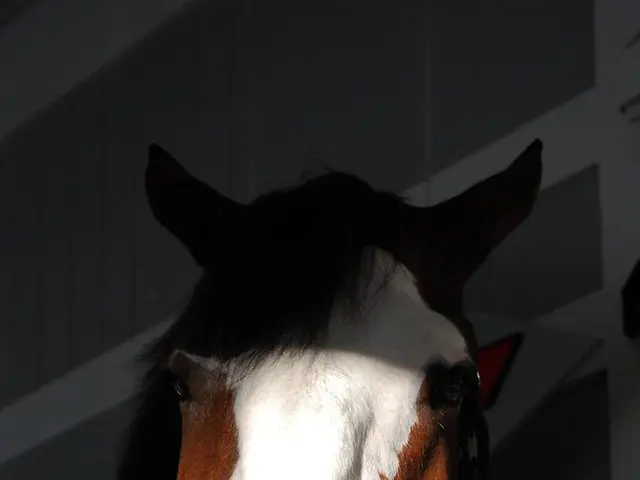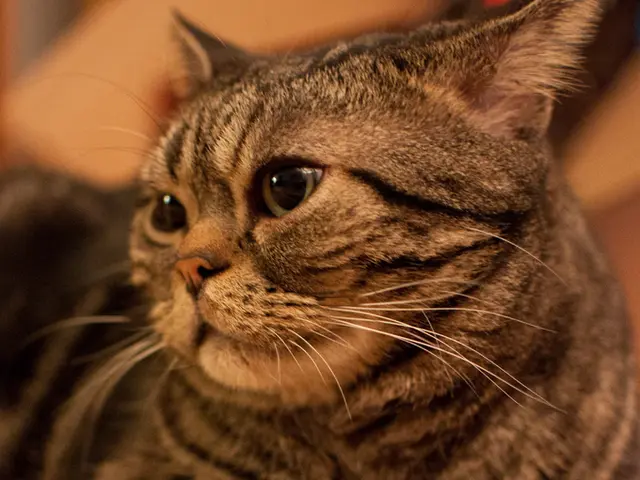Harmful Eats for Your Feline Friend: A Veterinary Guide
Bit of a troublemaker, aren't ya? You want a guide for the sneaky food traps lurking around for your kitty, huh? Well, here's the skinny on what not to give your furball if you value their health.
Last year, the Pet Poison Helpline released a report on the five most common pet poisons for cats, and guess what? Three of 'em were simple household items – chocolate, onions, and garlic!
To keep your feline friend purring rather than puking, here's a list of foods it's best to keep out of their little paws:
- Alcohol: This stuff's notorious for messing with human beings, and it's just as nasty for cats. Even a teensy drop can trigger neurological symptoms like stumbles, trouble breathing, tremors, comas, or even death.
- Caffeinated drinks and foods: Caffeine can cause all sorts of gastrointestinal issues for your cat, like vomiting and diarrhea, along with hyperactivity, abnormal heart rhythms, tremors, seizures, and straight-up death.
- Cannabis-containing items: They say cats have nine lives, but they might as well have none if they start nibbling on Pothead Pete's stash. Cannabis can lead to dribbling urine, nausea, sensitivity to noise and light, and in severe cases, it can trigger a decrease in heart rate, shallow breathing, and impaired consciousness.
- Chocolate: It's a sad day when matey can't have a taste of your delectable chocolate treat, but trust us, it's for the best. Chocolate contains theobromine, which stimulates the heart, and caffeine, which stimulates the brain and central nervous system. In cats, it can cause vomiting, diarrhea, restlessness, hyperactivity, tremors, frequent urination, and seizures – either severely or fatally.
- Citrus: A little citrus fruit won't kill 'em, but the stems, leaves, peels, and seeds are a whole different story. They contain concentrated amounts of citric acid, which can irritate your cat's stomach, impact their behavior, and potentially alter their consciousness.
- Coconut: The flesh and milk of fresh coconut contain oils that can cause stomach upset and diarrhea in cats. Drinking coconut water may lead to hyperkalemia, a dangerous potassium imbalance that can cause low heart rate (bradycardia) and irregular heart rate (arrhythmia).
- Garlic and onions: Always remember that Allium – like garlic, onions, leeks, shallots, and chives – are a big ol' no-no for your cat's sensitive tummy. These aromatic guys are full of a compound that damages red blood cells and can lead to anemia.
- Grapes and raisins: Small quantities might seem harmless, but not for your feline friend. These sweet, tiny snacks can cause vomiting, lethargy, diarrhea, and even kidney damage or kidney failure, making it best to keep them far away.
- Milk and dairy products: Despite our childhood adoration for pictures of contented kitties sipping milk, it's actually quite harmful for them. Cats don't produce much lactase, the enzyme needed to break down lactose, making milk consumption potentially disastrous for their digestive system.
- Moldy foods: Much like us humans, cats have a curious nature that can lead them to eat questionable items. Moldy or spoiled foods may contain mycotoxins that can cause harmful chemical reactions in your cat's body – often in the form of vomiting and digestive upset.
- Nuts: High in fat and hard to digest, nuts can cause pancreatitis, a potentially deadly inflammation of the pancreas.macadamia nuts are particularly toxic to pets, causing lethargy, loss of coordination, and paralysis. Other nuts prone to molding, like walnuts, peanuts, and pecans, should also be avoided.
- Raw eggs: Containing potentially dangerous bacteria like Salmonella and E. coli, raw eggs can lead to vomiting, bloody diarrhea, dehydration, and weakness in cats. Raw egg whites also contain the enzyme avidin, which can cause a vitamin deficiency over time.
- Raw meat and fish: Raw meat and fish can harbor bacteria like Salmonella and E. coli, and they can contain bones that could splinter and perforate your cat's esophagus or intestines.
- Salt: A little salt won't hurt your cat. But if your cat consumes too much, it can lead to salt poisoning. This includes salt from high-sodium human foods, such as meat jerky, table salt, and road salt used to melt ice. Signs of salt poisoning include increased thirst, frequent urination, vomiting, diarrhea, loss of consciousness, and electrolyte imbalance, which can lead to tremors, increased body temperature, seizures, and death.
- Yeast dough: Uncooked dough expands due to body heat and can cause gas to build up in your cat's stomach, leading to bloat that can cause life-threatening consequences. Additionally, yeast produces ethanol as a byproduct, potentially causing alcohol poisoning, as well.
Now, how to keep your little whisker-wagging friend away from these hazards? Awareness is key, but guess what? Cats are cunning creatures, so you'll need to do more than simply knowing what's best to avoid feeding them. Here are some tips to keep those problematic goodies out of paws' reach:
- Keep your eyes peeled and your cat out of the kitchen while whipping up something yummy.
- Store all unfriendly treats in cat-proof containers or behind closed doors.
- Inform family and friends that sharing food with your cat isn't a good idea – and be prepared to keep your cat in a separate room when feeding toddlers or young children.
- Use lidded cups and avoid leaving alcoholic beverages unattended, as cats are known to swipe a drink or two.
- If you've got a feline Houdini in the house, consider installing pet-proof locks on your kitchen and pantry.
- Keep the number for the pet poison helpline handy, just in case.
- Remember, even with precautions, it's hard to eliminate the risk completely. If you suspect your cat has ingested something dangerous, or you notice signs of toxicity, act swiftly and bring your cat to an emergency veterinarian immediately. From our furry friends to yours, it's always better to be safe than sorry!
- To maintain a healthy lifestyle for your pet, remember to avoid feeding them foods like alcohol, caffeine, cannabis, chocolate, citrus fruits, coconut, garlic and onions, grapes and raisins, milk and dairy products, moldy foods, nuts, raw eggs, raw meat and fish, salt, yeast dough, and food containing artificial sweeteners such as xylitol.
- To prevent your cat from accidentally consuming harmful substances, it's essential to keep these items out of reach by storing them properly, keeping the kitchen door closed while cooking, and informing friends and family about the potential dangers.
- Adopting a pet-friendly lifestyle goes beyond just maintaining a balanced food-and-drink regimen. Regular wellness check-ups, proper grooming, regular exercise, and a safe environment kept free of potential hazards like household cleaners and plants will increase your pet's overall health and wellness.








